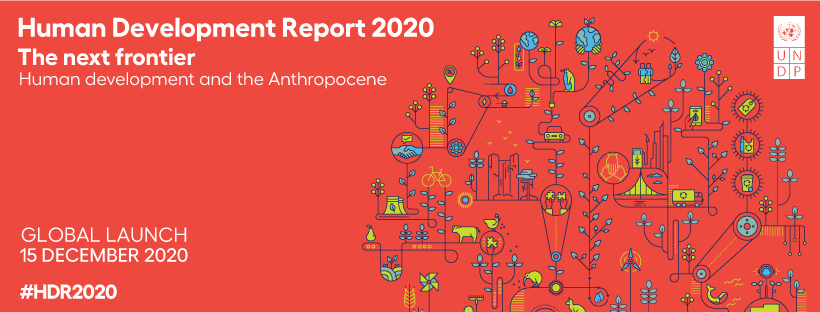
The COVID-19 pandemic is the latest crisis facing the world, but unless humans release their grip on nature, it won’t be the last, according to the 2020 Human Development Report, The Next Frontier: Human Development and the Anthropocene, published by the United Nations Development Programme (UNDP). The report argues that as people and planet enter an entirely new geological epoch -the Anthropocene or the Age of Humans-, it is time for all countries to redesign their paths to progress by fully accounting for the dangerous pressures humans put on the planet, and dismantle the gross imbalances of power and opportunity that prevent change.
“How people experience planetary pressures is tied to how societies work”, says Pedro Conceição, Director of UNDP’s Human Development Report Office and lead author of the report, “and today, broken societies are placing people and planet on a collision course”. According to the report, easing planetary pressures in a way that enables all people to flourish in this new age requires removing inequalities that stand in the way of transformation.
To illustrate the point, the 30th anniversary edition of the Human Development Report, introduces an experimental new lens to its annual Human Development Index (HDI). By adjusting the HDI, which measures a nation’s health, education, and standards of living, to include two more elements: a country’s carbon dioxide emissions and its material footprint, the report shows how the global development landscape would change if both the wellbeing of people and also the planet were central to defining humanity’s progress.
Ugo Blanco, Resident Representative a.i. of UNDP Barbados and the Eastern Caribbean, speaking on this innovative approach to the 2020 report and its impact on the region, stated “We are living in a different world today than we were yesterday. Almost overnight, a virus has changed our societies across the planet. COVID-19, inequalities and climate change are interconnected, so the pandemic has been a wakeup call to take immediate action. 2020 Human Development Report is particularly relevant for SIDS in general and for the Caribbean region in particular with exacerbated vulnerabilities and dependencies that demand urgent and unambiguous decisions.”
With the resulting Planetary-Pressures Adjusted HDI – or PHDI – a new global picture emerges, painting a less rosy but clearer assessment of human progress. For example, more than 50 countries drop out of the very high human development group, reflecting their dependence on fossil fuels and material footprint. Despite these adjustments, some countries in the Caribbean move upwards, recognising that lighter pressure on the planet is possible.
Further to this, the report highlights that public action can address these inequalities, with examples ranging from increasingly progressive taxation, to protecting coastal communities through preventive investment and insurance, a move that could safeguard the lives of 840 million people who live along the world’s coastlines. But there must be a concerted effort to ensure that actions do not further pit people against planet. “The next frontier for human development is not about choosing between people or trees; it’s about recognising, today, that human progress driven by unequal, carbon-intensive growth has run its course,” said Pedro Conceição. “By tackling inequality, capitalising on innovation and working with nature, human development could take a transformational step forward to support societies and the planet together,”.
To learn more about the 2020 Human Development report and UNDP’s analysis on the experimental Planetary Pressures-Adjusted HDI, visit http://hdr.undp.org/en/2020-report

With all due respect to the UNDP, the publication could be compressed into TWO WORDS: Sustainable development.
Please don’t pretend that this is a new “discovery”. Economists from the so-called “third world” have been singing the need for such change, moons ago.
Without providing an exhaustive list, it would be sufficient to read professor Clive Y. Thomas, formerly of the University of Guyana’s seminal publication: THE POOR AND THE POWERLESS, or the works of UWI’s Norman Girvan or Horace Campbell.
Our regional leaders too often enjoy making the slogan “a prophet is never honoured in his own land” ring true. They all seem to be suffering from “learned helplessness”
And notice that locally, I have not even mentioned the teachings of local stalwarts, Andrew Roger and Athie Martin.
Enough said!
HOTEP!